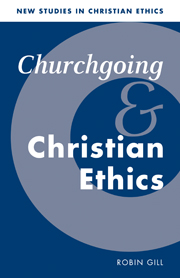Book contents
- Frontmatter
- Contents
- List of tables
- Preface
- List of abbreviations
- Introduction
- PART ONE THE THEORETICAL CONTEXT
- PART TWO THE EVIDENCE
- 4 The British Household Panel Survey
- 5 Faith in British Social Attitudes surveys
- 6 Moral Order in British Social Attitudes surveys
- 7 Love in British Social Attitudes surveys
- PART THREE THE IMPLICATIONS
- Postscript
- Works cited
- Index
6 - Moral Order in British Social Attitudes surveys
Published online by Cambridge University Press: 02 December 2009
- Frontmatter
- Contents
- List of tables
- Preface
- List of abbreviations
- Introduction
- PART ONE THE THEORETICAL CONTEXT
- PART TWO THE EVIDENCE
- 4 The British Household Panel Survey
- 5 Faith in British Social Attitudes surveys
- 6 Moral Order in British Social Attitudes surveys
- 7 Love in British Social Attitudes surveys
- PART THREE THE IMPLICATIONS
- Postscript
- Works cited
- Index
Summary
Real progress has now been made. The great fund of new data contained in British Social Attitudes establishes an unambiguous connection between churchgoing and Christian beliefs. An increase in churchgoing is significantly correlated with an increase in these beliefs. Patterns of believing amongst non-churchgoers also depend upon whether or not people went to church as children and the prevailing levels of belief in their surrounding culture. A cultural theory of churchgoing has been identified as fitting this evidence much better than a persistence, separation or even secularisation theory. It is unnecessary to spend any more time on this particular debate. Perhaps it has occupied the attention of recent sociologists of religion for too long. A cultural theory of churchgoing makes some sharper insights possible, especially on moral issues, and raises again the question which preoccupied the pioneers of sociology – does religious belonging shape moral vision? The reverse of this question is just as interesting – can moral vision survive a collapse of religious belonging?
British Social Attitudes again provides a wealth of, largely unexplored, evidence which is directly relevant to these questions. Using this evidence, alongside that from the British Household Panel Survey, it becomes possible for the first time to measure and compare the attitudes, and sometimes behaviour, of churchgoers and nonchurchgoers accurately over a wide range of moral concerns. It is even possible to detect changes over time and, again, to discern different types of both church-goers and nonchurchgoers. Most fascinating of all, it suggests important points of contact with some of the recent research done by New Testament scholars on early Christian morality.
- Type
- Chapter
- Information
- Churchgoing and Christian Ethics , pp. 145 - 170Publisher: Cambridge University PressPrint publication year: 1999



